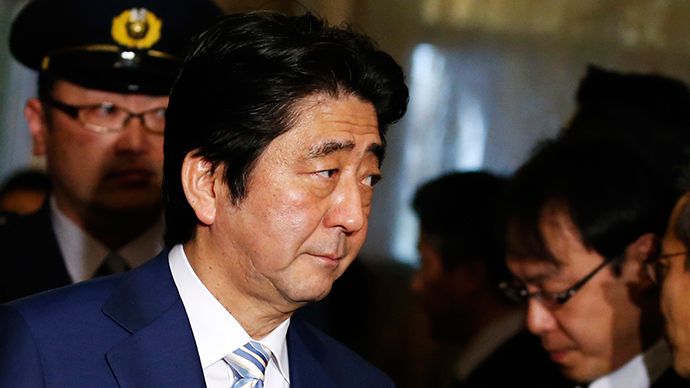Japanese hostages' beheading by ISIS 'almost Christmas present for Abe govt'

The government of Shinzo Abe is using the execution of the Japanese hostages by IS militants, which reports claim was partly provoked by the government’s own actions, to further its military agenda, James Corbett, editor of The Corbett Report, told RT.
RT:So will these killings push Japan into changing its long-held pacifist stance?
James Corbett: That’s absolutely what the Abe government is going to try to push. Especially since the latest session of the Japan's National Diet (the two-chamber legislature) has just convened. And in this session which will last about 150 days the Diet is going to be looking at 70 to 80 bills at least 10 of which directly concern Japanese security issues and the issue of the self defense force. Just last year the Abe government began a push to try to reinterpret the Japanese Constitution which has hardwired pacifism into the DNA of the Japanese state for the past 70 years, and to try to make it more militarily aggressive. And this seems almost like a late Christmas present for the Abe government because it stirs up the Japanese population and makes that militarization agenda more palatable to a traditionally pacifist nation.
RT:There's speculation in Japan's media that authorities knew about the kidnappings, but kept quiet to provoke the hostage crisis. Can you comment on that?
JC: Yes in fact that’s not speculation at this point. The Shukan Post, which is a weekly magazine here in Japan, had a pretty explosive story last week that they had found out about this kidnapping back in November of last year and had gone to the Japanese government for comment. They were told to keep quiet about it because the Japanese Foreign Ministry was secretly negotiating for the release of these hostages. Going on that information the Japanese government absolutely positively did know about this in at least November of last year. Despite that Prime Minister Abe embarked on a Middle East trip that had long been planned and during which on January 17 he announced in Cairo $200 million of aid to those countries fighting ISIS, a move that was absolutely guaranteed to provoke that type of response we saw unfold just in the last week or two. So absolutely the Japanese government did know and still acted deliberately to provoke the very situation that we’ve ended up with, which again goes to show that what’s happened is going to be used in furthering Abe government’s military agenda.

RT:What would the consequences be for the region if Japan does start giving its military more freedom?
JC: The reinterpretation of Article 9 of the Japanese Constitution which is the operative part is supposedly going to talk about collective self defense as a valid use of the Japanese military. The Japanese military at this point is supposedly prohibited from any overseas militarily aggressive operations. But under this new interpretation, any time any one of their allies is potentially threatened, the Japanese military can come to the aid of that partner anywhere in the world. Obviously countries like China have good reason to be worried about this because this is a step towards the outright militarization of Japan. And this has to be seen as being aimed at Japan’s main regional rival - China.Of course we’ve seen the growing tensions in the East China Sea over the last few years over some of the disputed islands here. Absolutely China is in the crosshairs of this, and that’s why the Chinese media is concerned about these recent developments.
RT:Do people in Japan typically think their country should project its military power more?
JC: It seems that the Japanese public is not reacting in quite the same way as the Japanese political class. The Japanese politicians and other politically connected insiders are calling this “Japan’s 9/11” and things of that nature. The Japanese public is actually quite furious with the Abe government in the way they handle the entire situation, and I think a lot of people realize that this is being used for political purposes. One of the most disgusting parts of this whole story is the legacy of a journalist like Kenji Goto who devoted years of his life to documenting the horrors and tragedy and senselessness of war is going to be used for a war agenda and I think a lot of people are actually quite outraged about that. So this might backfire in the long run or it might stir up the Japanese public opinion. That remains to be seen.
The statements, views and opinions expressed in this column are solely those of the author and do not necessarily represent those of RT.
The statements, views and opinions expressed in this column are solely those of the author and do not necessarily represent those of RT.











